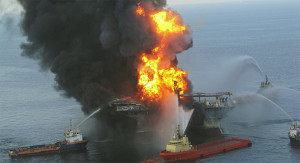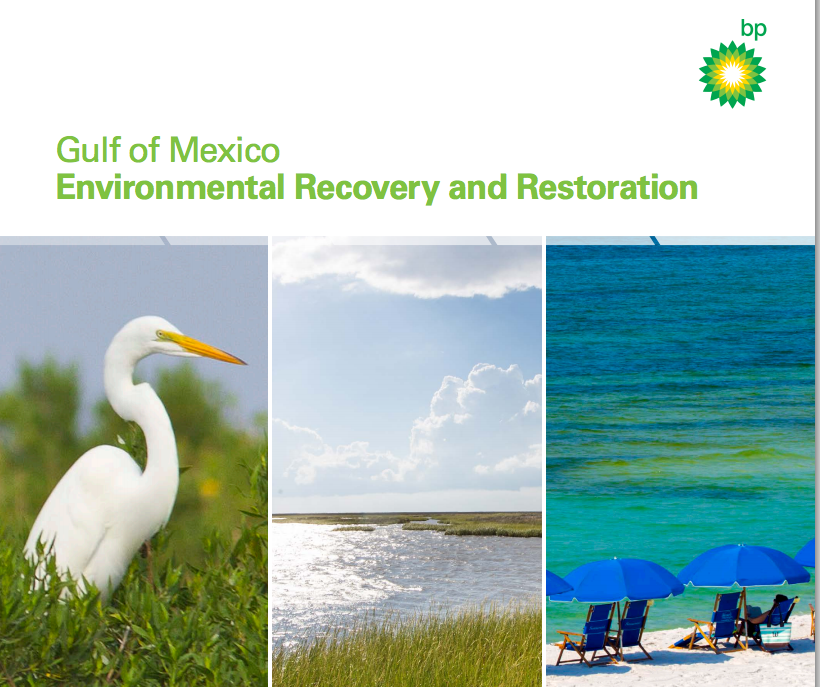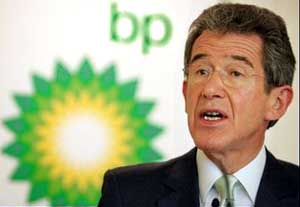Yesterday we celebrated marked Earth Day. President Obama gave a speech in The Everglades during which he chided FL. Gov. Rick Scott for banishing the term climate change from government employees’ lips. Separately, we were treated to the latest positive picture from a company still recovering from an oil spill that was the mother of oil spills.
I’m not talking Exxon Mobil, which a few years back used a more nefarious ad campaign to deflect public criticism of its business policies and practices. That company spent millions on national TV commercials promoting the role of school teachers, while at the same time quietly lobbying to undermine any effort to reverse climate change. It’s a tactic not unlike Philip Morris Companies’ or Koch Brothers’ support of the arts.
In this instant, we’re talking about BP, which this week marks the saddest and most consequential chapter in its history — the fifth anniversary of the explosion on the Deepwater Horizon oil platform that resulted in more than 200 million gallons of oil flowing into the pristine Gulf of Mexico waters over 87 days.

The current controversy concerns the latest BP PR campaign, which implies that the Gulf waters and the wildlife that inhabit it are back to pre-spill conditions. In Media Matters’s piece on the subject “TV Reporters Shoot Down BP’s Misleading PR Campaign,” the media watchdog agency had this to say:
“BP is trying very hard to convince the world that the Gulf of Mexico has recovered from the oil well explosion that killed 11 workers and devastated the region’s ecosystem and economy — but television reporters spent the five-year anniversary of the Deepwater Horizon disaster picking apart BP’s claims.”

In its coverage, Media Matters rattled off TV outlet after TV outlet calling out BP for what they felt is a most disingenuous campaign. And it wasn’t just MSNBC. MM cited Fox News’ Shepherd Smith who’s been known on occasion to sidestep Roger Ailes’ scripted talking points. Smith said:
“Five years later you see the BP commercials, everything is great. Right?” He then answered his own question, detailing the tourism and wildlife damages that still exist, and concluding: “Five years later, this ain’t over.”
Yet, I remember a time when BP earnestly tried to do the right thing when it came to the environment. I was sitting in my NYC office when I was called to a meeting with a senior colleague from our London office. He shared with me the “news” that a big oil company CEO would soon announce that climate change was real and needed to be dealt with.
Huh? Of course, climate change was real. Where’s the news, I asked incedulously? He explained that this executive, Sir John Browne of BP (now Lord Browne), a Stanford-educated geologist, would be the first oil industry CEO to actually acknowledge this scientific fact. Sir John would make this announcement at a speech at his alma mater where he would also announce BP’s investment in a large solar plant in northern CA. I was asked by my colleague to think about how to break this news, as well as to preside over the presser at the solar plant.

I soon found The New York Times writer most conversant with climate change issues, William Stevens, and suggested he and Sir John have a conversation. They did, and soon thereafter, the newspaper of record trumpeted on its front page above the fold (this was pre-digital) the revelation that set BP off on its transformational, case-studied journey. Stevens piece was titled “INDUSTRIES REVISIT GLOBAL WARMING” and included this:
“In what may be the most telling change, British Petroleum, the world’s third-largest oil company, broke ranks with other fossil fuel producers recently and announced that it believes that there is now enough scientific evidence to warrant concern about whether human activity — primarily the burning of fossil fuels like coal, oil and natural gas — is changing Earth’s climate.
The time to contemplate action ‘is not when the link between greenhouse gases and climate change is conclusively proven, but when the possibility cannot be discounted and is taken seriously,’ John Browne, the company’s chairman, said in a recent speech. British Petroleum, he said, ‘has reached that point.’ There is considerable uncertainty in these estimates. Nevertheless, Mr. Browne said in a telephone interview, ‘it seems to us it’s time we should do something’ about greenhouse gas emissions. ‘Just because there are uncertainties,’ he said, ‘it doesn’t mean you just stand still and do nothing.'”
The Times revisited Sir John’s fateful Stanford speech with a piece “How Green is BP“:
Last March, Lord John Browne, the group chief executive of the British oil giant BP, gave a speech at Stanford University. Had you stumbled into the auditorium partway through, you might be forgiven for assuming the man at the podium was not an oil baron, an industrialist, an extractor of fossil fuels from the tender earth but an environmentalist of the high church calling for the abolition of hydrocarbons, the very substance that had made his company and himself so fabulously rich.
Through this most counter-intuitive move, Lord Brown reinvented BP:
“Around the time Browne was at Stanford, sounding strikingly unlike an oil executive, BP was trying its own kind of identity shift, sounding strikingly unlike an oil company. Two years earlier, at a cost of $200 million, it began an enormous corporate rebranding exercise, shortening its name from British Petroleum to BP, coining the slogan ”Beyond Petroleum” and redesigning its corporate insignia.”
Browne even upped the reputational ante by announcing BP would end its political donations worldwide:
“In a speech here, Lord John Browne, BP’s chief executive, said that the decision reflected a belief that corporations ”must be particularly careful about the political process, not because it is unimportant — quite the reverse — but because the legitimacy of that process is crucial both for society and for us as a company working in that society.”
Somewhere in this new BP campaign touting the improvement in water quality in the Gulf lies a yearning for the company’s glory days when it was lauded for its social responsibility. In the case of the Gulf cleanup, can one argue with the fact that BP puts its money where its mouth is? No question it has. Does the self-congratulatory tone in its five-year report fully and accurately reflect the environmental state of the Gulf? Many think not, and there’s the rub.